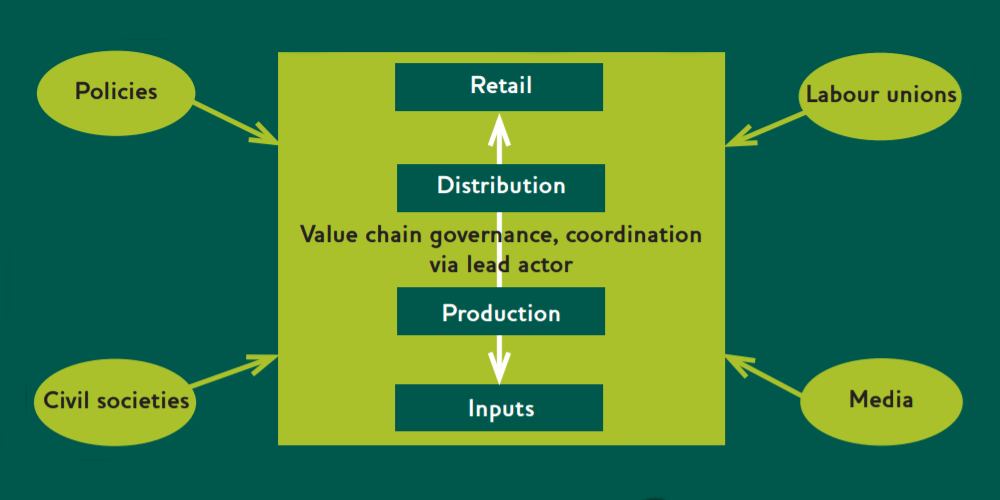The Covid-19 pandemic has disrupted global food systems, food markets, and food value chains. International food trade is one important indicator to understand the impact on food systems. The World Bank and FAO, amongst other multilateral organisations, published a statement before the Extraordinary G20 Agriculture Minister’s Meeting at the end of April that strongly asks countries “to strengthen cooperation” and to “ensure that policies, such as short-term measures to restrict trade, do not distort global markets”.

For some regional trade corridors in Africa, trade restrictions on borders and extra controls have impacted heavily on local food trade. West African traders of perishable produce and livestock, for example, have seen losses of 10 percent to 30 percent since health restrictions for Covid-19 came in, as transport is disrupted and markets close while illegal tax collection at checkpoints has leapt nearly 50 percent, according to data collected by the Permanent Interstate Committee for Drought Control in the Sahel (CILSS). The suggestion is that informal trade has been much more negatively impacted by border closures or expanded border checks.
Others highlight that most countries have learned from the global food crisis in 2007 when trade flows were disrupted heavily, and food prices spiked, with global flows and food prices of the most traded staple food remaining relatively stable during the pandemic. It is also true that most countries that introduced international trade restrictions on specific crops in March have reduced or lifted these restriction recently. For example, Vietnam and Myanmar which initially restricted the export of rice, lifted export restrictions in May after the meeting of ASEAN Agriculture Ministers.
Impacts on local food markets and supply-chains
However, as the West-African example shows, localised food trade has been disrupted, not because of export restrictions, but mainly because of border check and border closures. Continued uncertainties around the global spreading of the Covid-19 virus, has also had huge impact on local food markets and their local supply chains. Lockdown measures resulted in many food markets (formal and informal) in Latin America, Africa, and Asia to close down or operate under strict new guidelines of social distancing. Loss of income and remittances has reduced people’s ability to buy food, which affect the income of local farmers. Restrictions on mobility also has disrupted food supply chains and agricultural input supplies (e.g. labour shortages).
Even in the absence of a global food price spike, the result is localised food price shocks that affect the most vulnerable people first. The World Food Program’s Market Monitor reports that, in Q1 of 2020, some 15 countries saw the cost of a basic basket of food increase severely (more than 10 percent) and another 10 countries between 5-10 percent, mainly in Africa (e.g. Ghana, Mozambique, Zambia) and the Middle East (e.g. Turkey, Syria, Lebanon). The market monitor also alerts for food price spikes for parts in India, Pakistan and Afghanistan. The High Level Panel of Experts on Food Security and Nutrition, therefore, warned recently that the current crisis “will have differentiated impacts and will more strongly affect the poor and vulnerable”.
Innovative short-term interventions
For good reasons, the focus has been on emergency interventions to deal with the immediate crisis. Measures have been taken to keep supply chains working and scaling up activities, however, mostly through the formal sector and by supporting larger businesses. As economies start to open after lockdown, it is imperative that more innovative short-term interventions are needed that keep food markets, supply chains and production working in a safe way by including micro and small businesses both in the formal and informal food economy. For example, larger companies could work together with small local businesses to distribute food to and within neighbourhoods. Governments should also support micro and small food businesses to comply with the social distancing rules.
Importantly, short-term interventions should be linked as much as possible with longer-term policies for structural change. To do so means framing food markets with a systems approach that reflects the underlying constraints and recognises how these shape and are shaped by business incentives and the institutional environment. Depending on the , short-term and longer-term policies for change can create market opportunities for micro and small food enterprises and smallholder farmers, or alternatively disempower them and undermine resilience in responding to shocks.
Opportunities for structural changes
As diverse IDS research has shown, the degree to which food markets both the vital functions of delivering decent work and providing access to nutritious foods is an outcome of the interactions of policies, distribution networks, infrastructure, technological innovation, finance, information, and consumer awareness and preferences. As such the COVID-19 crisis and interventions should not be reason for delaying the sustainable development agenda; to fight environmental degradation and climate change, to stimulate nutritious and healthy food for all, and to increase better job opportunities in the food economy. On the contrary, the pandemic must trigger the acceleration of such policies that aim for structural changes in the food system.
This blog post is part of a series to introduce the Business, Markets and the State (BMAS) research cluster’s Position Papers. Read the position paper on food markets here and all the position papers here.